新概念英语二册超详教案讲义笔记Lesson 79 By air 乘飞机
文档属性
| 名称 | 新概念英语二册超详教案讲义笔记Lesson 79 By air 乘飞机 | 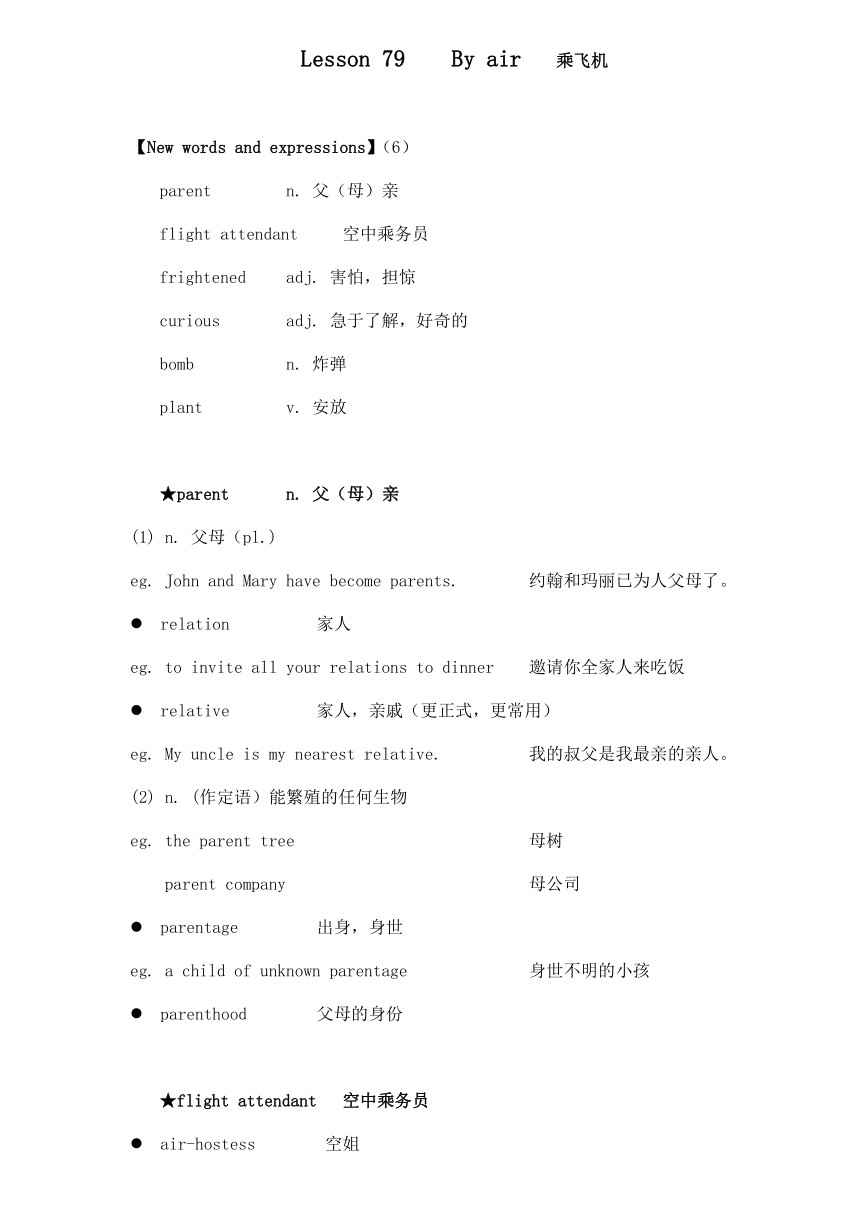 | |
| 格式 | docx | ||
| 文件大小 | 32.1KB | ||
| 资源类型 | 教案 | ||
| 版本资源 | 新概念英语 | ||
| 科目 | 英语 | ||
| 更新时间 | 2023-09-26 09:43:32 | ||
图片预览

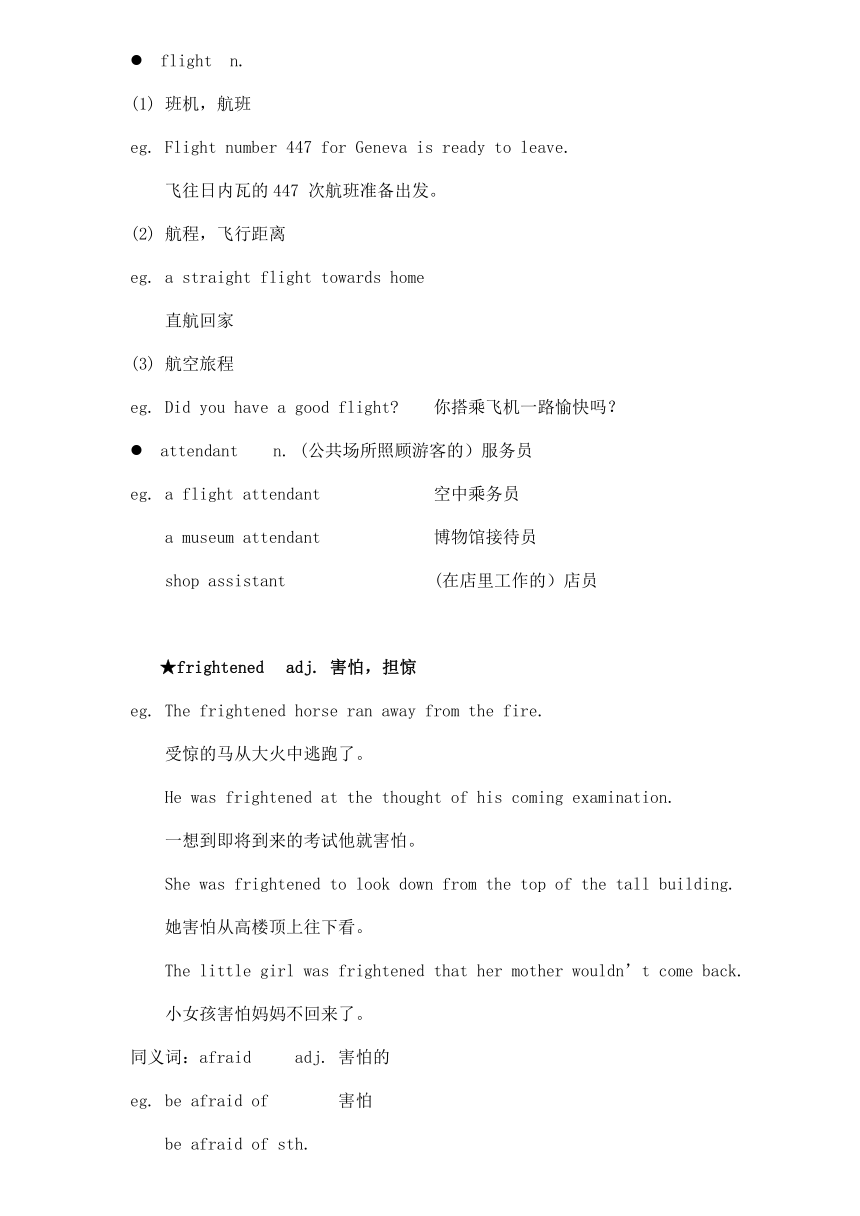
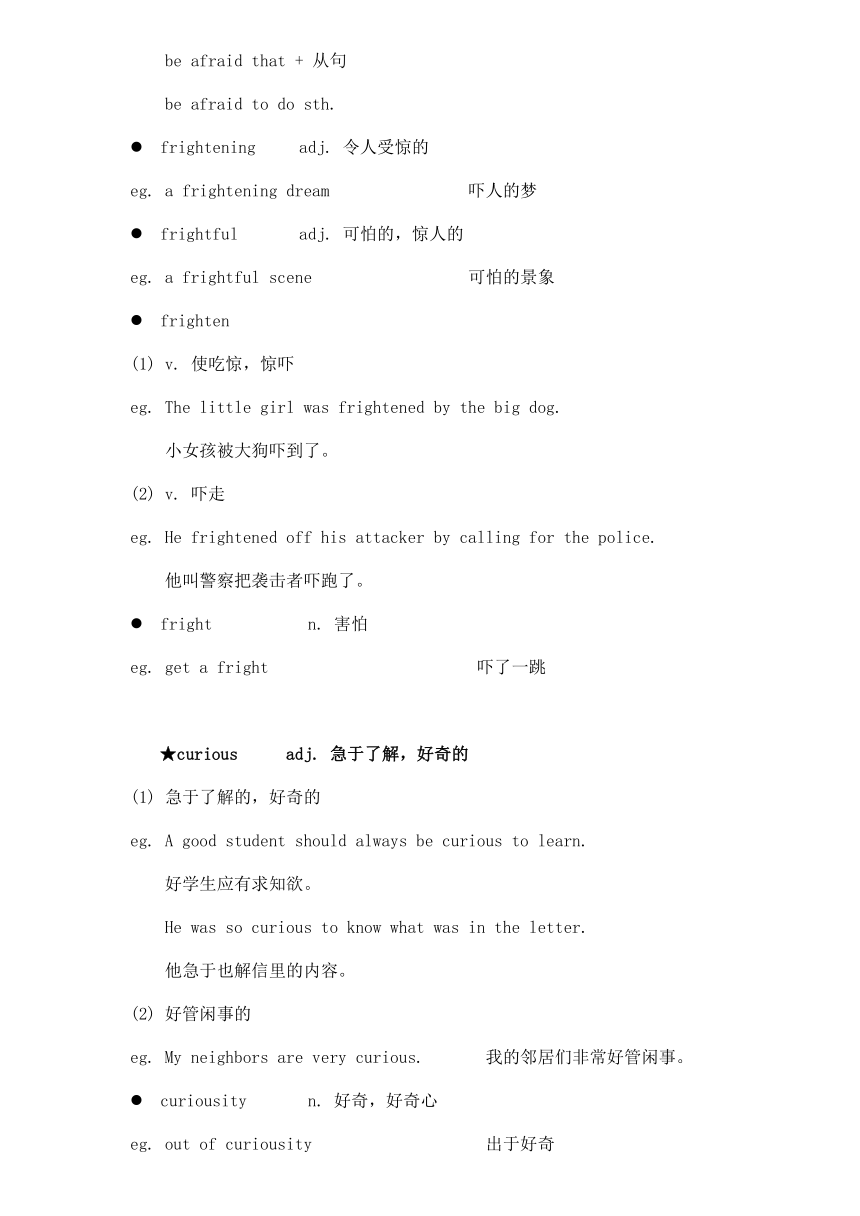
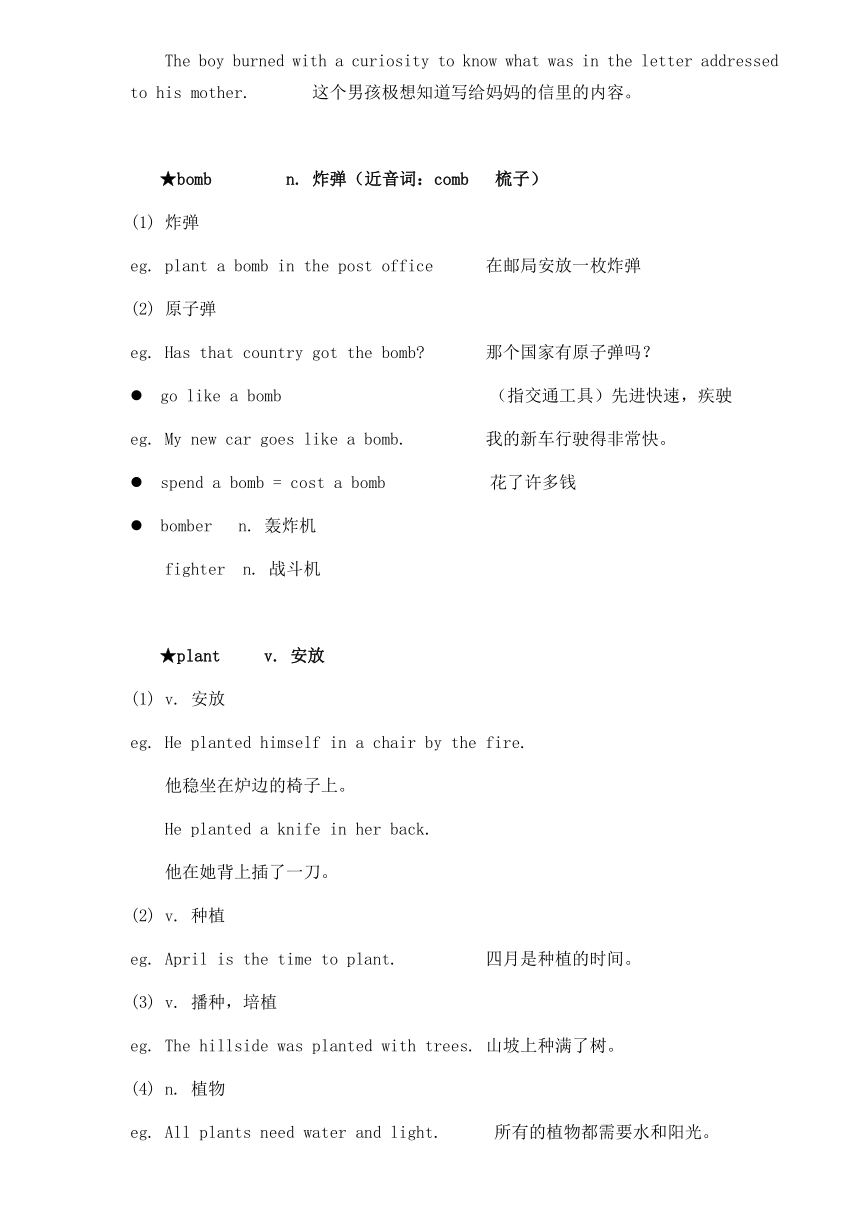
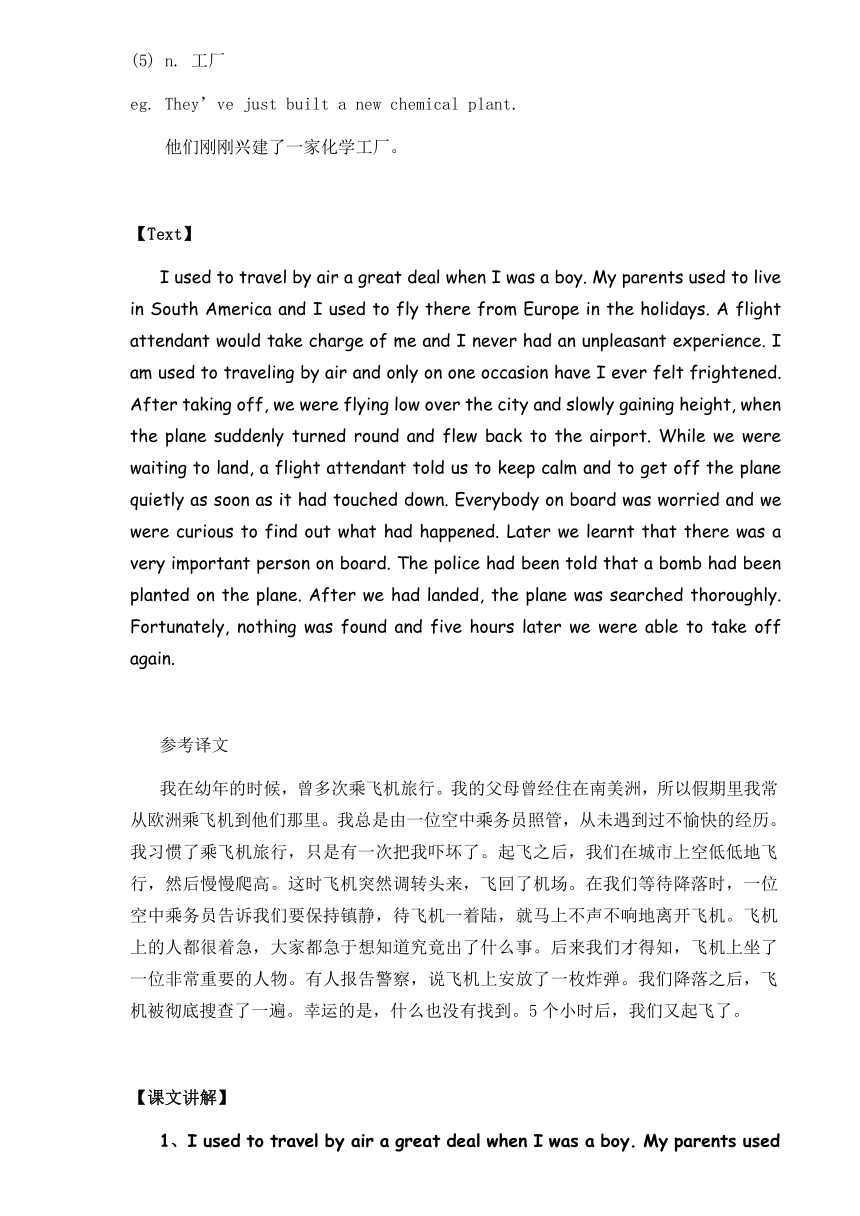
文档简介
Lesson 79 By air 乘飞机
【New words and expressions】(6)
parent n. 父(母)亲
flight attendant 空中乘务员
frightened adj. 害怕,担惊
curious adj. 急于了解,好奇的
bomb n. 炸弹
plant v. 安放
★parent n. 父(母)亲
n. 父母(pl.)
eg. John and Mary have become parents. 约翰和玛丽已为人父母了。
relation 家人
eg. to invite all your relations to dinner 邀请你全家人来吃饭
relative 家人,亲戚(更正式,更常用)
eg. My uncle is my nearest relative. 我的叔父是我最亲的亲人。
n. (作定语)能繁殖的任何生物
eg. the parent tree 母树
parent company 母公司
parentage 出身,身世
eg. a child of unknown parentage 身世不明的小孩
parenthood 父母的身份
★flight attendant 空中乘务员
air-hostess 空姐
flight n.
班机,航班
eg. Flight number 447 for Geneva is ready to leave.
飞往日内瓦的447 次航班准备出发。
航程,飞行距离
eg. a straight flight towards home
直航回家
航空旅程
eg. Did you have a good flight 你搭乘飞机一路愉快吗?
attendant n. (公共场所照顾游客的)服务员
eg. a flight attendant 空中乘务员
a museum attendant 博物馆接待员
shop assistant (在店里工作的)店员
★frightened adj. 害怕,担惊
eg. The frightened horse ran away from the fire.
受惊的马从大火中逃跑了。
He was frightened at the thought of his coming examination.
一想到即将到来的考试他就害怕。
She was frightened to look down from the top of the tall building.
她害怕从高楼顶上往下看。
The little girl was frightened that her mother wouldn’t come back.
小女孩害怕妈妈不回来了。
同义词:afraid adj. 害怕的
eg. be afraid of 害怕
be afraid of sth.
be afraid that + 从句
be afraid to do sth.
frightening adj. 令人受惊的
eg. a frightening dream 吓人的梦
frightful adj. 可怕的,惊人的
eg. a frightful scene 可怕的景象
frighten
v. 使吃惊,惊吓
eg. The little girl was frightened by the big dog.
小女孩被大狗吓到了。
v. 吓走
eg. He frightened off his attacker by calling for the police.
他叫警察把袭击者吓跑了。
fright n. 害怕
eg. get a fright 吓了一跳
★curious adj. 急于了解,好奇的
急于了解的,好奇的
eg. A good student should always be curious to learn.
好学生应有求知欲。
He was so curious to know what was in the letter.
他急于也解信里的内容。
好管闲事的
eg. My neighbors are very curious. 我的邻居们非常好管闲事。
curiousity n. 好奇,好奇心
eg. out of curiousity 出于好奇
The boy burned with a curiosity to know what was in the letter addressed to his mother. 这个男孩极想知道写给妈妈的信里的内容。
★bomb n. 炸弹(近音词:comb 梳子)
炸弹
eg. plant a bomb in the post office 在邮局安放一枚炸弹
原子弹
eg. Has that country got the bomb 那个国家有原子弹吗?
go like a bomb (指交通工具)先进快速,疾驶
eg. My new car goes like a bomb. 我的新车行驶得非常快。
spend a bomb = cost a bomb 花了许多钱
bomber n. 轰炸机
fighter n. 战斗机
★plant v. 安放
v. 安放
eg. He planted himself in a chair by the fire.
他稳坐在炉边的椅子上。
He planted a knife in her back.
他在她背上插了一刀。
v. 种植
eg. April is the time to plant. 四月是种植的时间。
v. 播种,培植
eg. The hillside was planted with trees. 山坡上种满了树。
n. 植物
eg. All plants need water and light. 所有的植物都需要水和阳光。
(5) n. 工厂
eg. They’ve just built a new chemical plant.
他们刚刚兴建了一家化学工厂。
【Text】
I used to travel by air a great deal when I was a boy. My parents used to live in South America and I used to fly there from Europe in the holidays. A flight attendant would take charge of me and I never had an unpleasant experience. I am used to traveling by air and only on one occasion have I ever felt frightened. After taking off, we were flying low over the city and slowly gaining height, when the plane suddenly turned round and flew back to the airport. While we were waiting to land, a flight attendant told us to keep calm and to get off the plane quietly as soon as it had touched down. Everybody on board was worried and we were curious to find out what had happened. Later we learnt that there was a very important person on board. The police had been told that a bomb had been planted on the plane. After we had landed, the plane was searched thoroughly. Fortunately, nothing was found and five hours later we were able to take off again.
参考译文
我在幼年的时候,曾多次乘飞机旅行。我的父母曾经住在南美洲,所以假期里我常从欧洲乘飞机到他们那里。我总是由一位空中乘务员照管,从未遇到过不愉快的经历。我习惯了乘飞机旅行,只是有一次把我吓坏了。起飞之后,我们在城市上空低低地飞行,然后慢慢爬高。这时飞机突然调转头来,飞回了机场。在我们等待降落时,一位空中乘务员告诉我们要保持镇静,待飞机一着陆,就马上不声不响地离开飞机。飞机上的人都很着急,大家都急于想知道究竟出了什么事。后来我们才得知,飞机上坐了一位非常重要的人物。有人报告警察,说飞机上安放了一枚炸弹。我们降落之后,飞机被彻底搜查了一遍。幸运的是,什么也没有找到。5个小时后,我们又起飞了。
【课文讲解】
1、I used to travel by air a great deal when I was a boy. My parents used to live in South America and I used to fly there from Europe in the holidays.
used to do 过去常常做某事
by air 乘坐飞机
used to live in South America 过去住在南美
used to fly there 过去常常飞往那里
2、A flight attendant would take charge of me and I never had an unpleasant experience.
take charge (of)… 负责照料(某人/某物)
eg. Can you take charge of this class please, Miss Jones
琼斯小姐,你能照料这个班吗?
in someone’s charge 受管理,由(某人)负责
= under someone’s charge
eg. This hospital is in her charge until the director comes back.
在主管回来之前,这家医院由他负责。
in charge of 负责
eg. I’ll be in charge of the whole factory next week when the director is away.
下周厂长不在的时候,我负责整个工厂。
bring a charge against 控告(某人)
eg. The police brought a charge of murder against me.
警方控告我谋杀。
unpleasant adj. 不愉快的,讨厌的
eg. unpleasant smells 恶心的气味
unpleasant weather 讨厌的天气
a few unpleasant words 一些难听的话
an unpleasant experience 一个不愉快的经历
unpleasantness n. 不愉快
eg. Don’t let the recent unpleasantness end our friendship.
不要让眼下这些不愉快终止我们的友谊。
un + adj. 构成相反含义的adj.
unpractised 笨手笨脚的
unprincipled 无原则的,无廉耻的
unprofessional 非本行的
unmannerly 粗鲁的
unmarried 未婚的
unknown 不知道的,不知名的
unfortunate 不幸的
unforgettable 难以忘怀的
3、I am used to travelling by air and only on one occasion have I ever felt frightened.
be used to doing sth. 习惯于做某事
= be used to sth.
eg. I am not used to drinking. 我不习惯喝酒。
a man used to country life 习惯了乡村生活的人
only on one occasion 只有一次
only on one occasion have I ever felt frightened
(如果only 加上一个状语放在句首,那么就要用倒装语序,即把助动词提前,把肯定句语序变成一般疑问句语序。)
Only(seldom, hardly) + 状语 放在句首时,用倒装句
以never, little, often, 等词引起的句子,也常用倒装语序。
倒装句:
倒装句的结构为“副词+助动词(be,do,have,can,must等+主语+句子的其余部分”。
eg. Only in this way can you hope to improve the situation there.
只有用这种方式你才有希望改善那儿的状况。
Hardly had he finished when someone rose to refute his views.
他刚一讲完就有人站起来驳斥他的观点。
Scarcely had she fallen asleep when a knock at the door awakened her.
她刚一睡着就被敲门声吵醒了。
Not until quite recently did I have any idea what a guided missile was like.
直到最近我才清楚导弹是什么样的。
Never before has our country been as united as it is today.
今天我们的国家空前团结。
Many a time has he given us good advice.
他有很多次给我们好的建议。
Little did we suspect that the district was so rich in mineral resources.
我们一点也没想到这个地区的矿产资源如此丰富。
Often did we warn them not to do so.
我们经常警告他不要这样做。
用倒装句的情况:
① 句首为否定或近似否定的副词(never,rarely,little,on no occasion,hardly,no sooner…that等):
Little does he realize how important this meeting is.
Never has he got so many letters.
On no occasion must you accept any money if he offers it.
② 句首为only构成的词组(如only after,only then等):
Only then did I realize what a mistake I have made.
Only after she had taken off her coat and hat could I recognize her.
如果only 加上一个状语放在句首,那么就要用倒装语序。即把肯定句语序变成一般疑问句语序。
eg. It is only in recent years that it gained bad reputation. 强调句型
Only in recent years did the tree gain bad reputation. 倒装句也表示强调
4、After taking off, we were flying low over the city and slowly gaining height, when the plane suddenly turned round and flew back to the airport.
take off 起飞
(反义词:touch down 着陆,降落)
fly low over 在…上方低低地飞行
fly back to 飞回
fly
v. 飞,飞行
eg. A bee flew in through the open window.
一只蜜蜂从开着的窗户飞了进来。
v. 开飞机
eg. He was the first man ever to fly that type of aircraft.
他是第一个驾驶那种飞机的人。
v. 搭乘飞机
eg. I always fly British Airways.
我经常搭乘英航的飞机。
fly 习语:
eg. I must fly. / We must fly. 我们必须快点了。
(口)急忙离去。
fly into a temper 勃然大怒
The bird has flown。 犯人逃跑了
make the dust fly 引起争吵
= make the fur fly
= make the sparks fly
slowly = gradually 逐渐地,缓慢地
gain height 爬高(gain vt. 获得,增加)
gain speed 加速
gain experience 获得经验
when = at that time
turn round = turn around 调头
turn away 拒伸援手
turn back
往回走
把(某页的角)折起来
eg. Turn the page back and it will mark your place.
把某一页折个角,做个记号。
turn down
减弱,降低
eg. Turn that radio down at once! 立刻把收音机声音关小点。
拒绝
eg. She turned him down. 她拒绝了他。
turn in
归还
eg. You must turn in your uniform when you leave the army.
当你离开部队的时候,你必须归还制服。
(美)交,缴
eg. This is a poor piece of work you’ve turned in.
你交的作品很糟糕。
While we were waiting to land, a flight attendant told us to keep calm and to get off the plane quietly as soon as it had touched down.
land v. 着陆
eg. This plane can land anywhere. 这架飞机能在任何地方着陆。
keep calm 保持镇定
keep + adj. (eg. keep warm; keep silent)
tell us to keep calm 告诉我们保持镇定
tell us to get off the plane quietly 告诉我们安静地下飞机
(tell sb. to do sth. 告诉某人做某事)
touch down = land 飞机着陆
6、Everybody on board was worried and we were curious to find out what
had happened.
on board 在……(如飞机)上,搭乘(船、飞机、火车、汽车等)
go by the board (指计划,安排等)完全失败
sweep the board 在选举中几获全胜
above board 安全公开而手段正当的
be curious to do sth. 好奇做某事
Later we learnt that there was a very important person on board. The police had been told that a bomb had been planted on the plane.
learnt = know 得知
very important person 重要人物(缩写:VIP)
8、After we had landed, the plane was searched thoroughly. Fortunately, nothing was found and five hours later we were able to take off again.
thoroughly = completely 彻底地,完全地
take off
起飞
脱下(反义词:put on 穿上)
模仿
eg. He is always taking his teacher off.
他总是模仿他的老师。(以诙谐或嘲讽的方式模仿或假扮某人)
关于take的短语:
take after 相像
eg. Young Tom takes after his father. 汤姆长得像他父亲。
= Young Tom resembles his father.
(在长相或性格方面像父亲或母亲)
take up
填满,占据(空间或时间)
eg. The wardrobe takes up a lot of space. 那个衣柜很占空间。
= The wardrobe occupies a lot of space.
开始从事某事
eg. He has taken up French. 他开始学习法语了。
= He has begun to learn French.
take to 逐渐习惯于做某事(take to + n./doing)
eg. When his wife died, he took to drinking.
他妻子死后,他染上酗酒的习惯。
take in 欺骗,蒙蔽或愚弄某人
eg. He was so persuasive that I was taken in. 他这么能说,我被欺骗了。
= He was so persuasive that I was deceived.
take down 写下,记下(= write down)
eg. The reporter took down everything I said. 这个记者把我说的话都记下了。
take over 接收,接管(= be in charge of)
eg. The business was doing very badly until Jones took over.
琼斯接手这个公司之前,公司已经很差。
【Key Structures】
过去时 / 过去进行时 (L:7, L:31, L:55)
used to do / was (were) + doing
过去常常做某事 / 过去某时正在做某事
【Special Difficulties】
与take有关的短语动词
take off
① 脱下(衣服、鞋子等)
Why don’t you take off your coat/hat/glasses
②(飞机)起飞,(鸟)飞起
The plane will take off in half an hour.
③(嘲弄地)模仿(口语)
He takes people off so well he ought to go on the stage.
He is always taking his teacher off.
=He is always making fun of him by imitating him.
take after (长相、性格等)像(父母等)
Jane isn’t easy to get along with. She takes after her mother.
take up
① 占(时间、地点等)
This work won’t take up too much of your time.
Your books have taken up too much space.
② 开始(从事、产生兴趣等)
He took up tennis/painting two years ago.
He has taken up French. =He has begun to learn French.
take to 养成……的习惯,开始沉缅于(后跟名词或动名词)
When did he take to drinking/smoking
take in 欺骗(口语,常用被动语态)
On one occasion I was taken in.
take down 写下,记下
I forgot to take down his telephone number.
The reporter took down everything I said.
take over 接收,接管
We all hope that things will get better when the new manager takes over.
【Summary Writing】
The plane took off and flew low over the city. When it was slowly gaining height, it suddenly had to return to the airport. Meanwhile the passengers were told to keep calm. After they had disembarked, they learnt that there was a very important person on board. Someone had told the police that bomb had been planted on the plane, but though it was searched, nothing was found. Five hours later, it took off again.
After having taken off, the plane flew low over the city. Although it was slowly gaining height, it had to return to the airport. During this time, the passengers were told to keep calm until they had disembarked. Later they learnt that there was a very important person on board. Because the police had been told that a bomb had been planted on the plane, it was searched, however, nothing was found, so five hours later it took off again.
【New words and expressions】(6)
parent n. 父(母)亲
flight attendant 空中乘务员
frightened adj. 害怕,担惊
curious adj. 急于了解,好奇的
bomb n. 炸弹
plant v. 安放
★parent n. 父(母)亲
n. 父母(pl.)
eg. John and Mary have become parents. 约翰和玛丽已为人父母了。
relation 家人
eg. to invite all your relations to dinner 邀请你全家人来吃饭
relative 家人,亲戚(更正式,更常用)
eg. My uncle is my nearest relative. 我的叔父是我最亲的亲人。
n. (作定语)能繁殖的任何生物
eg. the parent tree 母树
parent company 母公司
parentage 出身,身世
eg. a child of unknown parentage 身世不明的小孩
parenthood 父母的身份
★flight attendant 空中乘务员
air-hostess 空姐
flight n.
班机,航班
eg. Flight number 447 for Geneva is ready to leave.
飞往日内瓦的447 次航班准备出发。
航程,飞行距离
eg. a straight flight towards home
直航回家
航空旅程
eg. Did you have a good flight 你搭乘飞机一路愉快吗?
attendant n. (公共场所照顾游客的)服务员
eg. a flight attendant 空中乘务员
a museum attendant 博物馆接待员
shop assistant (在店里工作的)店员
★frightened adj. 害怕,担惊
eg. The frightened horse ran away from the fire.
受惊的马从大火中逃跑了。
He was frightened at the thought of his coming examination.
一想到即将到来的考试他就害怕。
She was frightened to look down from the top of the tall building.
她害怕从高楼顶上往下看。
The little girl was frightened that her mother wouldn’t come back.
小女孩害怕妈妈不回来了。
同义词:afraid adj. 害怕的
eg. be afraid of 害怕
be afraid of sth.
be afraid that + 从句
be afraid to do sth.
frightening adj. 令人受惊的
eg. a frightening dream 吓人的梦
frightful adj. 可怕的,惊人的
eg. a frightful scene 可怕的景象
frighten
v. 使吃惊,惊吓
eg. The little girl was frightened by the big dog.
小女孩被大狗吓到了。
v. 吓走
eg. He frightened off his attacker by calling for the police.
他叫警察把袭击者吓跑了。
fright n. 害怕
eg. get a fright 吓了一跳
★curious adj. 急于了解,好奇的
急于了解的,好奇的
eg. A good student should always be curious to learn.
好学生应有求知欲。
He was so curious to know what was in the letter.
他急于也解信里的内容。
好管闲事的
eg. My neighbors are very curious. 我的邻居们非常好管闲事。
curiousity n. 好奇,好奇心
eg. out of curiousity 出于好奇
The boy burned with a curiosity to know what was in the letter addressed to his mother. 这个男孩极想知道写给妈妈的信里的内容。
★bomb n. 炸弹(近音词:comb 梳子)
炸弹
eg. plant a bomb in the post office 在邮局安放一枚炸弹
原子弹
eg. Has that country got the bomb 那个国家有原子弹吗?
go like a bomb (指交通工具)先进快速,疾驶
eg. My new car goes like a bomb. 我的新车行驶得非常快。
spend a bomb = cost a bomb 花了许多钱
bomber n. 轰炸机
fighter n. 战斗机
★plant v. 安放
v. 安放
eg. He planted himself in a chair by the fire.
他稳坐在炉边的椅子上。
He planted a knife in her back.
他在她背上插了一刀。
v. 种植
eg. April is the time to plant. 四月是种植的时间。
v. 播种,培植
eg. The hillside was planted with trees. 山坡上种满了树。
n. 植物
eg. All plants need water and light. 所有的植物都需要水和阳光。
(5) n. 工厂
eg. They’ve just built a new chemical plant.
他们刚刚兴建了一家化学工厂。
【Text】
I used to travel by air a great deal when I was a boy. My parents used to live in South America and I used to fly there from Europe in the holidays. A flight attendant would take charge of me and I never had an unpleasant experience. I am used to traveling by air and only on one occasion have I ever felt frightened. After taking off, we were flying low over the city and slowly gaining height, when the plane suddenly turned round and flew back to the airport. While we were waiting to land, a flight attendant told us to keep calm and to get off the plane quietly as soon as it had touched down. Everybody on board was worried and we were curious to find out what had happened. Later we learnt that there was a very important person on board. The police had been told that a bomb had been planted on the plane. After we had landed, the plane was searched thoroughly. Fortunately, nothing was found and five hours later we were able to take off again.
参考译文
我在幼年的时候,曾多次乘飞机旅行。我的父母曾经住在南美洲,所以假期里我常从欧洲乘飞机到他们那里。我总是由一位空中乘务员照管,从未遇到过不愉快的经历。我习惯了乘飞机旅行,只是有一次把我吓坏了。起飞之后,我们在城市上空低低地飞行,然后慢慢爬高。这时飞机突然调转头来,飞回了机场。在我们等待降落时,一位空中乘务员告诉我们要保持镇静,待飞机一着陆,就马上不声不响地离开飞机。飞机上的人都很着急,大家都急于想知道究竟出了什么事。后来我们才得知,飞机上坐了一位非常重要的人物。有人报告警察,说飞机上安放了一枚炸弹。我们降落之后,飞机被彻底搜查了一遍。幸运的是,什么也没有找到。5个小时后,我们又起飞了。
【课文讲解】
1、I used to travel by air a great deal when I was a boy. My parents used to live in South America and I used to fly there from Europe in the holidays.
used to do 过去常常做某事
by air 乘坐飞机
used to live in South America 过去住在南美
used to fly there 过去常常飞往那里
2、A flight attendant would take charge of me and I never had an unpleasant experience.
take charge (of)… 负责照料(某人/某物)
eg. Can you take charge of this class please, Miss Jones
琼斯小姐,你能照料这个班吗?
in someone’s charge 受管理,由(某人)负责
= under someone’s charge
eg. This hospital is in her charge until the director comes back.
在主管回来之前,这家医院由他负责。
in charge of 负责
eg. I’ll be in charge of the whole factory next week when the director is away.
下周厂长不在的时候,我负责整个工厂。
bring a charge against 控告(某人)
eg. The police brought a charge of murder against me.
警方控告我谋杀。
unpleasant adj. 不愉快的,讨厌的
eg. unpleasant smells 恶心的气味
unpleasant weather 讨厌的天气
a few unpleasant words 一些难听的话
an unpleasant experience 一个不愉快的经历
unpleasantness n. 不愉快
eg. Don’t let the recent unpleasantness end our friendship.
不要让眼下这些不愉快终止我们的友谊。
un + adj. 构成相反含义的adj.
unpractised 笨手笨脚的
unprincipled 无原则的,无廉耻的
unprofessional 非本行的
unmannerly 粗鲁的
unmarried 未婚的
unknown 不知道的,不知名的
unfortunate 不幸的
unforgettable 难以忘怀的
3、I am used to travelling by air and only on one occasion have I ever felt frightened.
be used to doing sth. 习惯于做某事
= be used to sth.
eg. I am not used to drinking. 我不习惯喝酒。
a man used to country life 习惯了乡村生活的人
only on one occasion 只有一次
only on one occasion have I ever felt frightened
(如果only 加上一个状语放在句首,那么就要用倒装语序,即把助动词提前,把肯定句语序变成一般疑问句语序。)
Only(seldom, hardly) + 状语 放在句首时,用倒装句
以never, little, often, 等词引起的句子,也常用倒装语序。
倒装句:
倒装句的结构为“副词+助动词(be,do,have,can,must等+主语+句子的其余部分”。
eg. Only in this way can you hope to improve the situation there.
只有用这种方式你才有希望改善那儿的状况。
Hardly had he finished when someone rose to refute his views.
他刚一讲完就有人站起来驳斥他的观点。
Scarcely had she fallen asleep when a knock at the door awakened her.
她刚一睡着就被敲门声吵醒了。
Not until quite recently did I have any idea what a guided missile was like.
直到最近我才清楚导弹是什么样的。
Never before has our country been as united as it is today.
今天我们的国家空前团结。
Many a time has he given us good advice.
他有很多次给我们好的建议。
Little did we suspect that the district was so rich in mineral resources.
我们一点也没想到这个地区的矿产资源如此丰富。
Often did we warn them not to do so.
我们经常警告他不要这样做。
用倒装句的情况:
① 句首为否定或近似否定的副词(never,rarely,little,on no occasion,hardly,no sooner…that等):
Little does he realize how important this meeting is.
Never has he got so many letters.
On no occasion must you accept any money if he offers it.
② 句首为only构成的词组(如only after,only then等):
Only then did I realize what a mistake I have made.
Only after she had taken off her coat and hat could I recognize her.
如果only 加上一个状语放在句首,那么就要用倒装语序。即把肯定句语序变成一般疑问句语序。
eg. It is only in recent years that it gained bad reputation. 强调句型
Only in recent years did the tree gain bad reputation. 倒装句也表示强调
4、After taking off, we were flying low over the city and slowly gaining height, when the plane suddenly turned round and flew back to the airport.
take off 起飞
(反义词:touch down 着陆,降落)
fly low over 在…上方低低地飞行
fly back to 飞回
fly
v. 飞,飞行
eg. A bee flew in through the open window.
一只蜜蜂从开着的窗户飞了进来。
v. 开飞机
eg. He was the first man ever to fly that type of aircraft.
他是第一个驾驶那种飞机的人。
v. 搭乘飞机
eg. I always fly British Airways.
我经常搭乘英航的飞机。
fly 习语:
eg. I must fly. / We must fly. 我们必须快点了。
(口)急忙离去。
fly into a temper 勃然大怒
The bird has flown。 犯人逃跑了
make the dust fly 引起争吵
= make the fur fly
= make the sparks fly
slowly = gradually 逐渐地,缓慢地
gain height 爬高(gain vt. 获得,增加)
gain speed 加速
gain experience 获得经验
when = at that time
turn round = turn around 调头
turn away 拒伸援手
turn back
往回走
把(某页的角)折起来
eg. Turn the page back and it will mark your place.
把某一页折个角,做个记号。
turn down
减弱,降低
eg. Turn that radio down at once! 立刻把收音机声音关小点。
拒绝
eg. She turned him down. 她拒绝了他。
turn in
归还
eg. You must turn in your uniform when you leave the army.
当你离开部队的时候,你必须归还制服。
(美)交,缴
eg. This is a poor piece of work you’ve turned in.
你交的作品很糟糕。
While we were waiting to land, a flight attendant told us to keep calm and to get off the plane quietly as soon as it had touched down.
land v. 着陆
eg. This plane can land anywhere. 这架飞机能在任何地方着陆。
keep calm 保持镇定
keep + adj. (eg. keep warm; keep silent)
tell us to keep calm 告诉我们保持镇定
tell us to get off the plane quietly 告诉我们安静地下飞机
(tell sb. to do sth. 告诉某人做某事)
touch down = land 飞机着陆
6、Everybody on board was worried and we were curious to find out what
had happened.
on board 在……(如飞机)上,搭乘(船、飞机、火车、汽车等)
go by the board (指计划,安排等)完全失败
sweep the board 在选举中几获全胜
above board 安全公开而手段正当的
be curious to do sth. 好奇做某事
Later we learnt that there was a very important person on board. The police had been told that a bomb had been planted on the plane.
learnt = know 得知
very important person 重要人物(缩写:VIP)
8、After we had landed, the plane was searched thoroughly. Fortunately, nothing was found and five hours later we were able to take off again.
thoroughly = completely 彻底地,完全地
take off
起飞
脱下(反义词:put on 穿上)
模仿
eg. He is always taking his teacher off.
他总是模仿他的老师。(以诙谐或嘲讽的方式模仿或假扮某人)
关于take的短语:
take after 相像
eg. Young Tom takes after his father. 汤姆长得像他父亲。
= Young Tom resembles his father.
(在长相或性格方面像父亲或母亲)
take up
填满,占据(空间或时间)
eg. The wardrobe takes up a lot of space. 那个衣柜很占空间。
= The wardrobe occupies a lot of space.
开始从事某事
eg. He has taken up French. 他开始学习法语了。
= He has begun to learn French.
take to 逐渐习惯于做某事(take to + n./doing)
eg. When his wife died, he took to drinking.
他妻子死后,他染上酗酒的习惯。
take in 欺骗,蒙蔽或愚弄某人
eg. He was so persuasive that I was taken in. 他这么能说,我被欺骗了。
= He was so persuasive that I was deceived.
take down 写下,记下(= write down)
eg. The reporter took down everything I said. 这个记者把我说的话都记下了。
take over 接收,接管(= be in charge of)
eg. The business was doing very badly until Jones took over.
琼斯接手这个公司之前,公司已经很差。
【Key Structures】
过去时 / 过去进行时 (L:7, L:31, L:55)
used to do / was (were) + doing
过去常常做某事 / 过去某时正在做某事
【Special Difficulties】
与take有关的短语动词
take off
① 脱下(衣服、鞋子等)
Why don’t you take off your coat/hat/glasses
②(飞机)起飞,(鸟)飞起
The plane will take off in half an hour.
③(嘲弄地)模仿(口语)
He takes people off so well he ought to go on the stage.
He is always taking his teacher off.
=He is always making fun of him by imitating him.
take after (长相、性格等)像(父母等)
Jane isn’t easy to get along with. She takes after her mother.
take up
① 占(时间、地点等)
This work won’t take up too much of your time.
Your books have taken up too much space.
② 开始(从事、产生兴趣等)
He took up tennis/painting two years ago.
He has taken up French. =He has begun to learn French.
take to 养成……的习惯,开始沉缅于(后跟名词或动名词)
When did he take to drinking/smoking
take in 欺骗(口语,常用被动语态)
On one occasion I was taken in.
take down 写下,记下
I forgot to take down his telephone number.
The reporter took down everything I said.
take over 接收,接管
We all hope that things will get better when the new manager takes over.
【Summary Writing】
The plane took off and flew low over the city. When it was slowly gaining height, it suddenly had to return to the airport. Meanwhile the passengers were told to keep calm. After they had disembarked, they learnt that there was a very important person on board. Someone had told the police that bomb had been planted on the plane, but though it was searched, nothing was found. Five hours later, it took off again.
After having taken off, the plane flew low over the city. Although it was slowly gaining height, it had to return to the airport. During this time, the passengers were told to keep calm until they had disembarked. Later they learnt that there was a very important person on board. Because the police had been told that a bomb had been planted on the plane, it was searched, however, nothing was found, so five hours later it took off again.
同课章节目录
